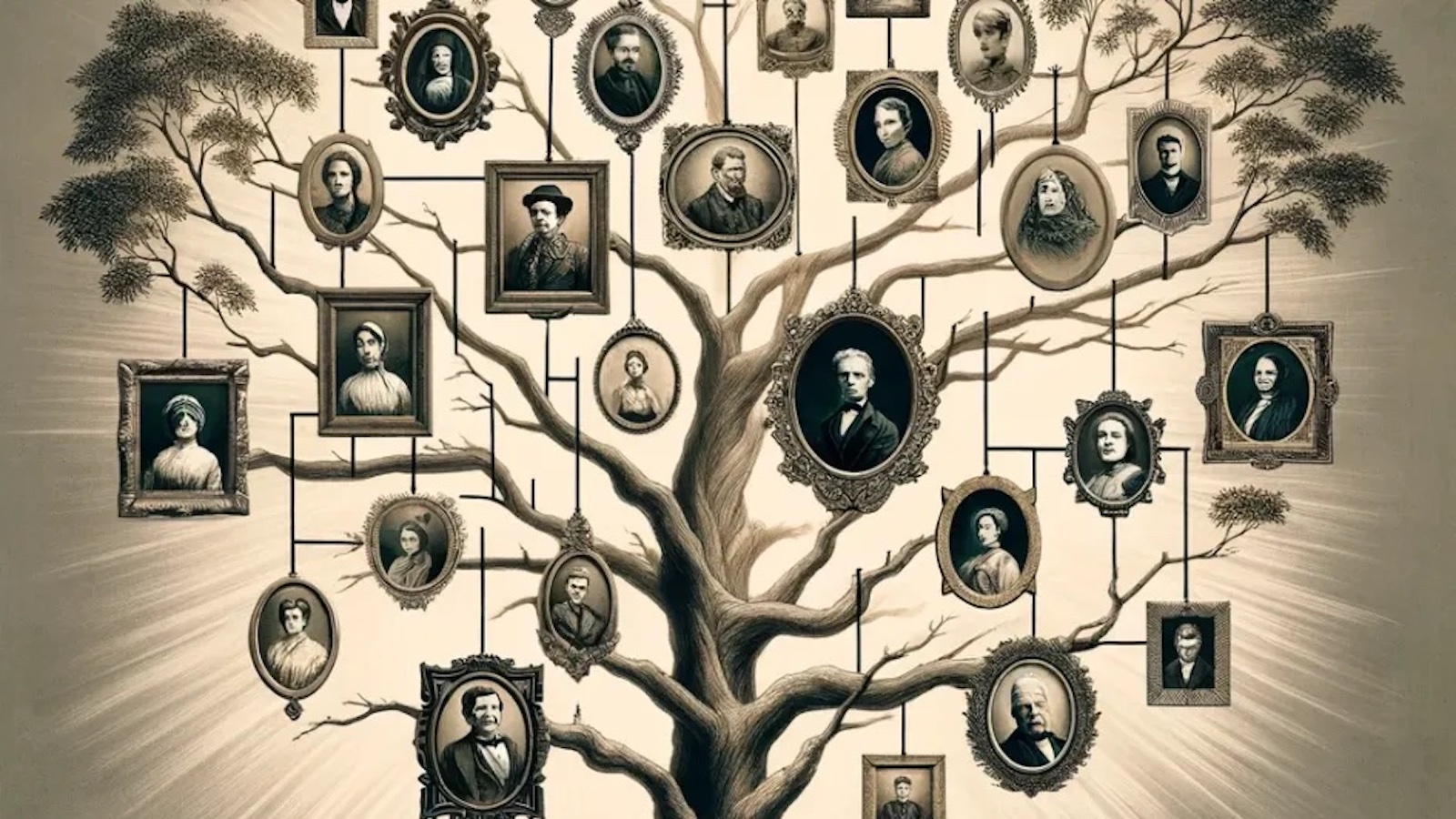
To Whom, To Where
A century ago, an enterprising maternal ancestor of mine compiled a genealogical log of our family back to the 17th century. “Peters of New England: a genealogy, and family history” can be purchased on Amazon for the hearty paperback price of fifty smackers. It’s a wonder of foresightedness and the combustion engine that a record of my pedigree could have been bound then purchased and delivered on my doorfront with a simple trackpad click. A family tree with two-day shipping—what a country! What’ll they think of next? Using spit in a phial to detect Old Country genes?
I once performed a filial excavation within the kin codex, tracing my direct zygotic line back nine generations to when who I think is my great, great, great, great… lots of greats… grandfather first came to the untamed land that would eventually become the United States. The first recording of Andrew Peeters, whom the authors refer to as my “earliest ancestor,” happened in Boston almost four-hundred years ago. Why he kicked off from the old sod to the new plush is an impetus lost to history’s undulating forces of decision and action. But it was in Beantown the earliest of my familial ménage manifested.
When I informed my oldest daughter that she was a tenth generation American, whose ancestors established themselves over a century before our country hacked off its colonial trappings to become a full-fledged nation, she expressed awe, wonderment, and a staggering reverence for the unbroken tapestry of blood and genes. Only kidding! She asked me to crank up the volume on “The Little Mermaid.” Snubbed for an animated crustacean: the eternal fate of fathers.
Why bring up my otiose effort to instill my kids with appreciation for their rich, cycloramic heritage? Because there are children being born who lack that blooded connection with the past, who are veritable orphans in an indifferent world.
Legal scholar Jeff Shafer recently delivered a grave speech before the “Meaning vs. the Machine” colloquium last month. In “Producing the Global Baby,” Shafer accomplishes what all prophets of a dark-clouded future foretell: the logical outcome of humanity’s confident conceit. The calamityst N.S. Lyons and motorbike philosopher Matthew Crawford were so arrested by Shafer’s dystopian imaginings that they both reprinted the text.
Shafer’s warning is a foundational fusillade, aimed ab initio, as any substantive exposition must be. He starts with the start: not with the law, but the impetus for its codification. The “family, not the individual, is the real molecule of society, the key link of the social chain of being,” wrote sociologist Robert Nisbet. Laws over custody, inheritance, taxes, marriage, and sundry financial claims necessarily derive from the creation of kinfolk. The IRS’s joint-return tome was drawn up not in creation of but in recognition of holy matrimony. In brief, the “inseparable union of souls” isn’t just a tax write-off. (Though there should be a tax credit awarded for enduring your wife’s nagging. Maybe the thrice-married President Trump can grant us husbands this needed reprieve.)
It follows that childbearing occupies the ex-ante positioning within the law. Shafer elucidates: “The recognition that a child has an identity bound up in hereditary descent, and that the father-mother-child triad is a profundity central to the human condition therefore meriting unique deference in the law, has been a constant throughout human history.” That “deference” is necessarily determined by the living, breathing, seeing, crying infant, who has come into corporeality. Obligations—such as shelter, basic sustenance, pedagogy, sharpening pencils, building pillow forts, answering midnight calls to ward off threatening shadows—were minted de jure in reflection of the natural order. (Some laws don’t require official government sanction—they exist by virtue of the piercing cry of “MOMMY!” or “DADDY!” that forms an inviolable decree.)
Should the mother or father walk out on the family? Then government agents are accorded authority to track deadbeat dad or floozy mom down and dun him or her for child support.
The potential, nay, nearing prospect, of children created entirely devoid of knowable lineage unsettles Shafer. The “The Assisted Reproductive Technology (ART)… exists to decouple child-creation from conjugal relation,” he explains, leaving the vital question: “To whom do children belong?” Wherein lies custody of a child assembled from the disparate parts of female and male anatomy, who, through capricious or imprudent indulgence, is birthed by unknown or untraceable parents? If the default answer is “the state,” which state has an obligation for the defenseless newborn should the biological makings be transnational, a product of a globalized, far-reaching industry? The child, Shafer concludes, “has no default placement, no security of embeddedness, no people, no ancestors, no family history that the child is extending.”
A “global citizen” is an oxymoron, a floating concept, an abstract theorem, not oriented toward posterity, nor tied to a specific place. It’s within the country, as Ed West wrote, that “ancestry is the defining characteristic of membership.” But for test-tube globo-babies gestating in non-descript incubators studded across various locales? Well, even the most dimwitted pediatrician can tell you that children thrive within structure and purpose. The most annoying leftists are those who huffingly claim no allegiance to a flag, betraying deep-seated daddy issues. Now impute that attitude on a moon-faced fledging who can’t even count past ten or properly pronounce “fascism” without butchering its digraph. The petty tyranny of toddlers is oppressive enough—wait until they’re full grown with an empty-hole-sized chip on their shoulder.
In his essay in First Things, Catholic University professor Michael Hanby raises disturbing questions that, before the advent of technologized reproduction, wouldn’t have thought to be asked, such as “What do you say to the teenager who asks why it was he who was selected from among his five embryonic siblings?” and “What do you tell the son of a single professional woman, conceived with donor sperm, when he asks about his father?”
Is it enough to tell the curious kid to be grateful for life and go back to drooling over CoComelon? Don’t questions of ancestral claim deserve to be answered by birthright?
We harness science and technology for, in the famed Bacon formulation, “the relief of man’s estate.” The desperation some infecund couples face is indeed a tragedy, and it’s understandable why they turn to mechanical aids such as in vitro fertilization. But, in our visionary hubris, we create an instrument that ethicist Oliver O’Donovan says “we do not know how to describe responsibly.”
So we’re back to the volatile question: to whom does a synthesized nationless ART child belong? Maybe Klaus Schwab can construct a massive daycare staffed with surrogate moms on the sugar-soft slopes of Davos.
Free the People publishes opinion-based articles from contributing writers. The opinions and ideas expressed do not always reflect the opinions and ideas that Free the People endorses. We believe in free speech, and in providing a platform for open dialogue. Feel free to leave a comment.



